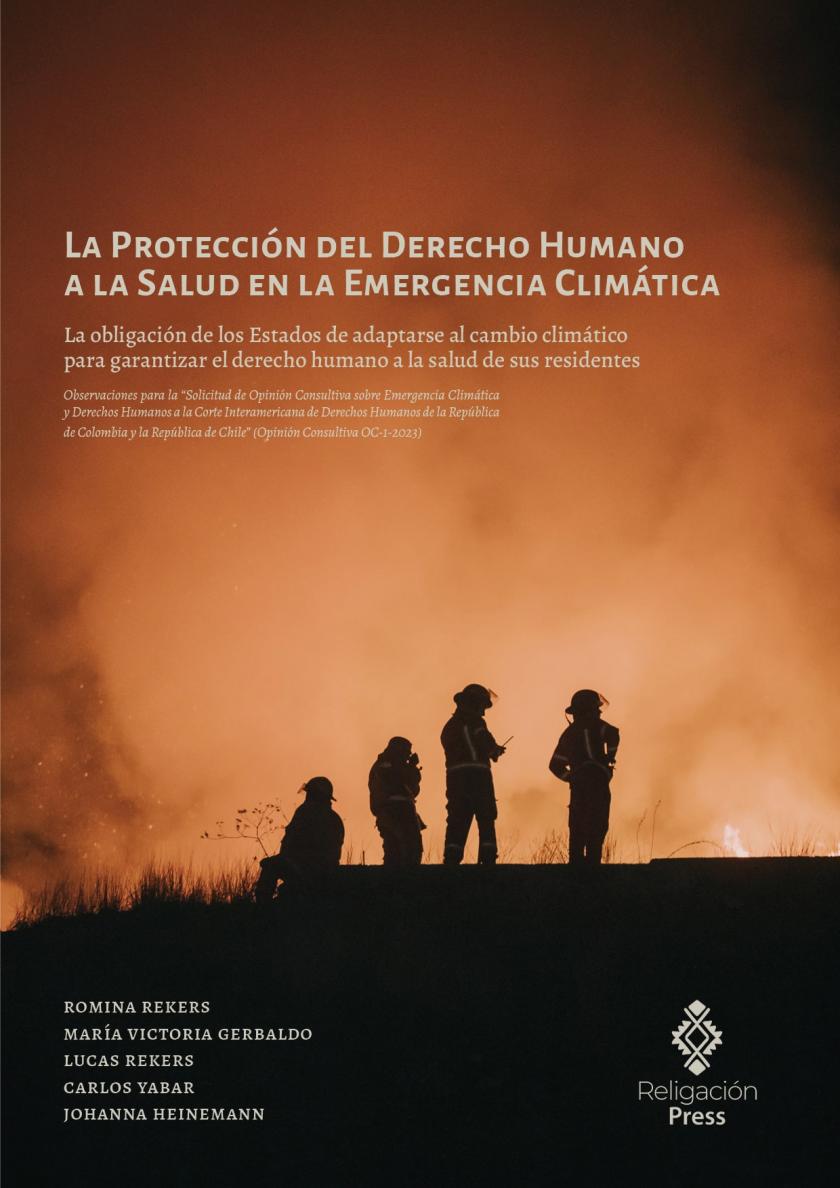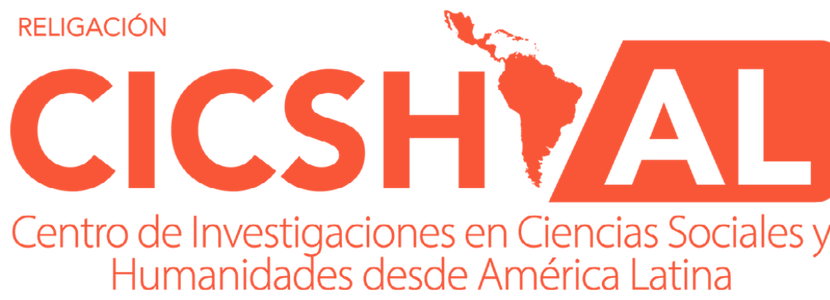Protegendo o direito humano à saúde na emergencia climática: A obrigação dos Estados de se adaptarem às mudanças climáticas a fim de garantir o direito humano à saúde de seus residentes. Observações sobre a "Solicitação de Opinião Consultiva sobre Emergência Climática e Direitos Humanos à Corte Interamericana de Direitos Humanos da República da Colômbia e da República do Chile" (Opinião Consultiva OC-1-2023).
Palavras-chave:
direitos humanos, saúde, mudanças climáticas.Sinopse
A emergência climática tem impacto sobre o direito humano à saúde, e os Estados e a comunidade internacional devem tomar medidas urgentes e conjuntas para resolver essa questão. Este relatório tem como objetivo fornecer ferramentas de uma abordagem de saúde climática para abordar algumas das questões sobre as obrigações dos Estados incluídas no Parecer Consultivo sobre Emergência Climática e Direitos Humanos apresentado pela Colômbia e pelo Chile à Corte Interamericana de Direitos Humanos. Nesse contexto, a adaptação dos sistemas de saúde surge como uma prioridade para enfrentar os desafios da emergência climática, especialmente para grupos vulneráveis, como mulheres, crianças, idosos, pessoas com deficiência e povos indígenas. Os facilitadores para uma transição justa para uma sociedade resiliente ao clima são descritos, incluindo várias formas de justiça (reconhecimento, processual, distributiva, intergeracional e epistêmica). Assim como o dever dos Estados de investigar e priorizar a pesquisa como garantia do direito à saúde. Aborda a lacuna epistêmica no acesso ao conhecimento científico e enfatiza a importância da justiça epistêmica na superação das desigualdades no acesso e uso do conhecimento.
Downloads
Referências
Aguilar Cavallo, G. (2023). La emergencia climática y los derechos humanos. Revista de Derecho, (27), e3315. https://doi.org/10.22235/rd27.3315
Alemmano, A. (2013). The Emergence of the Evidence-Based Judicial Reflex: A Response to Bar-Siman-Tov’s Semiprocedural Review. The Theory and Practice of Legislation, 1, 327–340.
Alexy, R. (2010). A Theory of Constitutional Rights. Oxford University Press.
Amarante, V., Galván, M., y Mancero, X. (2016). Inequality in Latin America: A Global Measurement. Cepal Review, 118.
Anderson, E. (2012). Epistemic justice as a virtue of social institutions. Social Epistemology, 26, 163–173.
Banco Mundial (2020). World Development Indicators. https://databank.worldbank.org/source/world-development-indicators
Banco Mundial (2016). Los desastres naturales empujan a 26 millones de personas a la pobreza y provocan pérdidas por USD 520 000 millones al año, según un nuevo análisis del Banco Mundial. (Comunicado de Prensa). https://acortar.link/UZKEo8
Bar-Siman-Tov, I. (2012). Semiprocedural Judicial Review. Legisprudence, 6, 271–300.
Beitz, C.R. (2009). The Idea of Human Rights. Oxford University Press.
Bianchini, A. (2021). Una justificación del deber de investigar: COVID-19, derecho a la ciencia y obligaciones distributivas. Revista de Bioderecho y Derecho, 51, 5–20.
Castellanos, E., Lemos, M.F., Astigarraga, L. et al. (2022). Central and South America. In H.O. Pörtner et al. (eds.). Climate Change 2022: Impacts, Adaptation and Vulnerability. (pp. 1689–1816) Cambridge University Press.
Choisy, M., McBride, A., Chambers, M., Ho Quang, C., Nguyen Quang, H., Xuan Chau, N. T., Thi, G. N., Bonell, A., Evans, M., Ming, D., Ngo-Duc, T., Quang Thai, P., Dang Giang, D. H., Dan Thanh, H. N., Ngoc Nhung, H., Lowe, R., Maude, R., Elyazar, I., Surendra, H., Ashley, E. A., … Yacoub, S. (2022). Climate change and health in Southeast Asia–defining research priorities and the role of the Wellcome Trust Africa Asia Programmes. Wellcome open research, 6, 278. https://doi.org/10.12688/wellcomeopenres.17263.3
Dann, P. (2010). Verfassungsgerichtliche Kontrolle gesetzgeberischer Rationalität. Der Staat, 49, 630–646.
Dieleman, S. (2015). Epistemic justice and democratic legitimacy. Hypatia, 30, 794–810.
Fricker, M. (2018). Epistemic injustice and recognition theory: A new conversation. Feminist Philosophy Quarterly, 4(4).
Fricker, M. (2017). Evolving concepts of epistemic injustice. In I.J. Kidd, J. Medina & G. Pohlhaus Jr. (eds.) Routledge Handbook of Epistemic Injustice (pp. 53–60). Routledge.
Fricker, M. (2007). Epistemic Injustice: Power and the Ethics of Knowing. Oxford University Press.
Fuldauer, L.I., Thacker, S., Haggis, R.A. et al. (2022). Targeting climate adaptation to safeguard and advance the sustainable development goals. Nature Communications, 13, 3579
Gargarella, R. (2020). Democracia y emergencia en América Latina. En J.P. Bohoslavsky (ed.), Covid-19 y Derechos Humanos: La Pandemia de la Desigualdad. Biblos.
Ghebreyesus, T.A. (2017, diciembre 10). Health is a fundamental human right: Health is a fundamental human right. http://www.who.int/news-room/commentaries/detail/health-is-a-fundamental-human-right
Gomes Canotilho, J.J. (1993). Direito Constitucional. Almedina.
Hammill, A., Dazé, A., & Dekens, J. (2019). The National Adaptation Plan (NAP) Process: Frequently Asked Questions. International Institute for Sustainable Development. https://acortar.link/cSgmX6
Hartinger, S. M., Yglesias-González, M., Blanco-Villafuerte, L., Palmeiro-Silva, Y. K., Lescano, A. G., Stewart-Ibarra, A., Rojas-Rueda, D., Melo, O., Takahashi, B., Buss, D., Callaghan, M., Chesini, F., Flores, E. C., Gil Posse, C., Gouveia, N., Jankin, S., Miranda-Chacon, Z., Mohajeri, N., Helo, J., Ortiz, L., … Romanello, M. (2023). The 2022 South America report of The Lancet Countdown on health and climate change: trust the science. Now that we know, we must act. Lancet regional health. Americas, 20, 100470. https://doi.org/10.1016/j.lana.2023.100470
Hunt, P. (2006). Using All the Tools at Our Disposal: Poverty Reduction and the Right to the Highest Attainable Standard of Health. Development Outreach. http://repository.essex.ac.uk/9681/
Hunt, P. (2006). Report of the Special Rapporteur on the Right of Everyone to the Enjoyment of Physical and Mental Health. U.N. Doc. E/CN.4/2006/48. http://digitallibrary.un.org/record/570103?ln=en
Hunt, P. (2005). Report of the Special Rapporteur on the Right of Everyone to the Enjoyment of Physical and Mental Health. U.N. Doc. E/CN.4/2005/51. http://digitallibrary.un.org/record/541734?ln=en
Least Developed Countries Expert Group (2012). National Adaptation Plans: Technical Guidelines for the National Adaptation Plan Process. UNFCCC Secretariat.
Mazzuoli, V.O., & Teixeira, G.F.M. (2014/2015). La protección jurídica del medio ambiente en la jurisprudencia de la Corte Interamericana de Derechos Humanos. Ius Humani: Revista de Derecho, 4, 193–226.
Medina, J. (2021). Injusticia epistémica y activismo epistémico en las protestas sociales feministas. Revista Latinoamericana de Filosofía Política, 10, 227–250.
Murrugarra, A. (2007). Pobreza y resiliencia: Una nueva lectura de un problema complejo. Bibliopsiquis, 8.
Nguyen, T. H., Nguyen, H. L., Nguyen, T. Y., Vu, S. N., Tran, N. D., Le, T. N., Vien, Q. M., Bui, T. C., Le, H. T., Kutcher, S., Hurst, T. P., Duong, T. T., Jeffery, J. A., Darbro, J. M., Kay, B. H., Iturbe-Ormaetxe, I., Popovici, J., Montgomery, B. L., Turley, A. P., Zigterman, F., … Hoffmann, A. A. (2015). Field evaluation of the establishment potential of wMelPop Wolbachia in Australia and Vietnam for dengue control. Parasites & vectors, 8, 563. https://doi.org/10.1186/s13071-015-1174-x
Oficina del Alto Comisionado de las Naciones Unidas para los Derechos Humanos. (2016). Estudio analítico de la relación entre el cambio climático y el derecho humano de todos al disfrute del más alto nivel posible de salud física y mental, 6 Mayo 2016, A/HRC/32/23. https://www.refworld.org.es/docid/576b857a4.htm
Organización Mundial de la Salud & Organización Panamericana de la Salud (2021). Una Salud: Un Enfoque Integral para Abordar las Amenazas para la Salud en la Interfaz entre los Seres Humanos, los Animales y el Medioambiente. http://www.paho.org/es/documentos/cd599-salud-enfoque-integral-para-abordar-amenazas-para-salud-interfaz-entre-seres
PNUD Bolivia (2013). Avances en el Conocimiento Cambio Climático y el Desafío de la Salud en Bolivia. http://www.bivica.org/files/cambio-climatico-salud.pdf
Popelier, P. (2017). Evidence-based lawmaking: Influences, obstacles and the role of the European Court of Human Rights. In J.H. Gerards & E. Brems (eds.) Procedural Review in European Fundamental Rights Cases. (pp. 79–94). Cambridge University Press
Popelier, P. (2015). The role of courts in legislative policy diffusion and divergence. The Theory and Practice of Legislation, 3, 315–331.
Popelier, P. (2012). Preliminary comments on the role of courts as regulatory watchdogs. Legisprudence, 6, 257–270.
Radi, B. (2022). Injusticia hermenéutica: un ejercicio de precisión conceptual. Estudios de Filosofía, 66, 97–110.
Rekers, R. (2023). The duty to adapt to climate change to protect human rights, draft under discussion for the “Climate Change and Technology. Ethical Challenges and Normative Responses”. 2nd Inter-University Conference for Emerging Scholars of St. Anna School of Advanced Studies, University of Graz and Central European University.
Rigaud, K., de Sherbinin, A., Jones, B., Bergmann, J., Clement, V., Ober, K., Schewe, J., Adamo, S., McCusker, B., Heuser, S., y Midgley, A. (2018). Groundswell: Preparing for Internal Climate Migration. World Bank. http://openknowledge.worldbank.org/handle/10986/29461.
Rodríguez-Díaz, M. (2021). Quillay y saponinas en épocas de Covid-19. Cuadernos Médico Sociales, 61(3), 75–77.
Rodríguez, Y. (2018). Potenciar la Resiliencia de las Ciudades y sus Territorios de Pertenencia en el Marco de los Acuerdos sobre Cambio Climático y de la Nueva Agenda Urbana. CEPAL
Romanello, M., Di Napoli, C., Drummond, P., Green, C., Kennard, H., Lampard, P., Scamman, D., Arnell, N., Ayeb-Karlsson, S., Ford, L. B., Belesova, K., Bowen, K., Cai, W., Callaghan, M., Campbell-Lendrum, D., Chambers, J., van Daalen, K. R., Dalin, C., Dasandi, N., Dasgupta, S., … Costello, A. (2022). The 2022 report of the Lancet Countdown on health and climate change: health at the mercy of fossil fuels. Lancet (London, England), 400(10363), 1619–1654. https://doi.org/10.1016/S0140-6736(22)01540-9
Rossi, J. (2006). La obligación de no regresividad en la jurisprudencia del Comité de Derechos Económicos, Sociales y Culturales. En C. Courtis (comp.) Ni un Paso Atrás: La Prohibición de Regresividad en Materia de Derechos Sociales. Editorial del Puerto.
Rossi, J., & Abramovich, V. (2007). La tutela de los derechos económicos, sociales y culturales en el artículo 26 de la Convención Americana sobre Derechos Humanos. Estudios Socio-Jurídicos, 9, 34–53.
Sánchez, L., & Reyes, O. (2015). Medidas de Adaptación y Mitigación frente al Cambio Climático en América Latina y el Caribe: Una Revisión General. CEPAL.
Sieckmann, J. (2013). Legislation as implementation of constitutional law: A foundation for the demand of legislative rationality. In L.J. Wintgens & A.D. Oliver-Lalana (eds.) The Rationality and Justification of Legislation: Essays in Legisprudence. (pp. 107–123). Springer.
Stanley, F., & Farrant, B. (2015). Climate Change and Children’s Health: A Commentary. Children, 2, 412–423.
Truccone-Borgogno, S. (2022). The supersession thesis, climate change, and the rights of future people. Critical Review of International Social and Political Philosophy, 25, 364–379.
Truccone-Borgogno, S. (2021a). La cuestión intergeneracional en la justicia climática. En S. Borràs Pentinat & P.M. Villavicencio Calzadilla (eds.) Justicia Climática: Visiones Constructivas desde el Reconocimiento de la Desigualdad. (pp. 299–330). Tirant lo Blanch.
Truccone-Borgogno, S. (2021b). The Temporal Dimension of Justice [Ph.D. Dissertation, University of Graz]. http://unipub.uni-graz.at/download/pdf/6390927
United Nations Framework Convention on Climate Change (2019). Overview: National Adaptation Plans. http://unfccc.int/topics/resilience/workstreams/national-adaptation-plans/overview
Waldron, J. (2004). Settlement, return, and the supersession thesis. Theoretical Inquiries in Law, 5, 237–268.
Waldron, J. (1992). Superseding historic injustice. Ethics, 103, 4–28.
Waldron, J. (2002). Redressing historic injustice. University of Toronto Law Journal, 52, 135–160.
World Health Organization (2021). National Health Adaptation Plans: Guidance for Addressing Climate Change Impacts on Human Health. World Health Organization.
World Health Organization (2014). Promoting Health While Mitigating Climate Change (Technical Briefing for the “World Health Organization Conference on Health and Climate”, 27–29 August, Geneva). http://www.afro.who.int/publications/promoting-health-while-mitigating-climate-change
World Health Organization (2021). Health in National Adaptation Plans: Review. World Health Organization. http://www.who.int/publications/i/item/9789240023604.
World Health Organization (2021). Quality Criteria for Health National Adaptation Plans. World Health Organization. http://www.who.int/publications/i/item/9789240018983

Publicado
Séries
Licença

Este trabalho está licenciado sob uma licença Creative Commons Attribution 4.0 International License.





